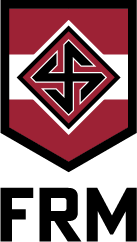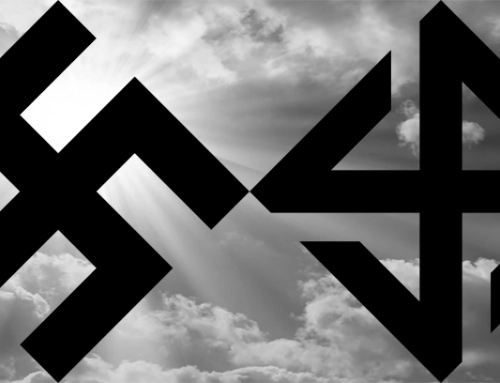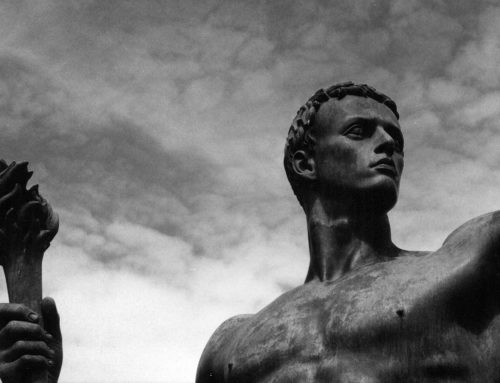Excerpts from Dieter Schwarz, Freemasonry: Ideology, Organization and Policy (Berlin: Central Publishing House of the NSDAP, 1944)
Jewish-Oriental Foundations
Freemasonry is an ideological form of hostility to National Socialism, the significance of which, in the historical development of the past two centuries, must be deemed comparable to the effects of other supranational organizations, the political churches, World Jewry, and Marxism. In its present form, it must be viewed as the bourgeois-liberal advance troops of World Jewry.
It corrupts the principles of all forms of government based on racial and folkish considerations, enables the Jews to achieve social and political equality, and paves the way for Jewish radicalism through its support of the principles of freedom, equality, and brotherhood, the solidarity of peoples, the League of Nations and pacifism, and the rejection of all racial differences.
With the help of its international connections and entanglements, Freemasonry interferes in the foreign policy relationships of all peoples, and pursues, through governmental leaders, secret foreign and world policies which escape the control of those in government.
Through its personal influences and economic favoritism, Freemasonry ensures that all dominant positions of the public, economic, and cultural life of a people are filled with lodge brethren, who in fact translate the concepts of Freemasonry into action.
The National Socialist state has destroyed the organizations of Freemasonry in Germany, and has likewise given rise to similar measures in a number of European states during the present war. But the liberal, Masonic body of thought lives on in the former lodge brethren. In addition, there is still a danger of a renewed penetration of Masonic ideas through the lodge organizations of states in which Freemasons remain free to pursue their objectives without hindrance.
Thus, researching this enemy, and providing a basic education for all racial comrades on the topic of Freemasonry, is not just a matter of expounding upon interest historical problems, rather it is an urgent duty of alertness in the struggle against our enemy.
Freemasonry is tightly allied with Jewry, and not just through its organization. Even the symbolism of Freemasonry through its customs, and to Hebrew through its words and signs, as its real origin. The Mason conceptual universe is a reflection of Jewish near-Eastern images and concepts.
The central point of Old Testament thought is represented by the concept of Yahweh as the Jewish “God”. Initially, the belief in many national deities prevailed among the Jews, for whom Yahweh was still an entirely insignificant desert god, until he sought out a “people” (the nomadic tribe of Israel) with whose help he could set about to dethrone all other gods and achieve world domination. In later Jewry, Yahweh was conceived of first as a High God, then as the One God; but his original nature was strictly retrained. To Jewry, the name of “Yahweh” implies a programme of world enslavement (see Isaiah chapter 60, etc).
With the development of the concept of Yahweh, the centralization of the Jewish religious cult was complete. Instead of the original numerous places of sacrifice in Canaan, a single one appeared: first Shilo (later Jerusalem); then the Royal Tent <Bundeszelt>, and later, the Temple of Solomon were considered the “House of Yahweh”. Just like Yahweh himself, the Temple became a symbol of Jewish plans for world domination (see Ezekiel, chapters 40-48; see also the New Testament, Revelation of St. John, chapter 21).
In the period after the Babylonian Captivity, “Prophetic Jewry” was supplemented by the priestly “Teachings of the Law” (Torah) and the “Books of Wisdom” (Chokmah). “Bourgeois decency” and social order were derived through heavy borrowings from neighbouring cultures, while Yahweh was given a cosmic characterization as the “World Master Builder”. At the same time, the way was paved for internationalistic attitudes (spreading Messianic teachings).
The spiritual attitudes of the Syrio-Phoenician “mysteries” merged with Old Testament thought about the time of the birth of Christ. The mysteries assumed a “feeling of sinfulness”: an inwardly torn human being to whom “divine mercy” was to be granted through mystical, that is, secret words, signs, and rituals, thereby achieving “salvation” and personal “eternal bliss”. All “evil” was attributed to the “Devil” (dualism). These concepts, sometimes depicted with great descriptive power, were reflected in the Jewish “Apocrypha” and New Testament texts around the time of the birth of Christ, as well as in the “Gnostic” writings of the following period.
This whole conceptual world was given a new lease on life through the symbolism and teachings of Freemasonry. The legend of Hiram, the symbol of the Temple with its religious strictures, the testing of courage upon acceptance into the lodge, the symbolic death ritual, the secret signs of recognition, embody in a perceptible, visual manner that which is later revealed in their teachings (the shaping of men from a rough stone into a cube, the building of a “Temple of Humanity”, the “Messianic”, “Empire of Peace” and of “World Brotherhood”, the rejection of all natural racial and political barriers in “World Brotherhood”). The symbols and teachings are, however, not uniformly developed based on definite original forms, but exhibit a colourful mixture of ingredients of the widest variety of types (syncretism), which makes it much more difficult to prove their origin in any particular case.
This Near Eastern conceptual world was first communicated to the entire West through the Church, which loyally guarded its Jewish “heritage”. The Arabian influence of Islam beginning in the 7th century, the experiences of the Crusades beginning in the 11th century, as well as the influence of Jewish philosophers (Ibn-Gebirol, Maimonides, the Cabbalists) beginning in the 12th century, led to a stronger emphasis on this Jewish-derived conceptual world. Jewish attitudes thus returned to the Western field of vision, whence they had been driven out by German scholasticism.
“Christian Cabbalists” (Pico de Mirandola) acquired particular prestige in the academies and religious associations of the Renaissance.
Scholars occupied themselves primarily with Hebrew texts, in which an eccentric search for “secrets” and bizarre insights may have played a part. These efforts were transmitted to Germany through Johannes Reuchlin and others. Secret societies were formed which attempted to build Jewish fantasies with theological elements into a system through an admixture of alchemy, mathematics, astronomy, and astrology, as well as magic.
Ideological Aims
The basic concepts of Freemasonry
The most contradictory declarations are made regarding the principles of Freemasonry by lodge organizations and leading Freemasons. One of these basic principles states that “Freemasonry strives to encourage, in a manner reflecting the customs of the early lodges, the moral ennoblement of Man, and human happiness in general”. (Declaration of the “Grand Lodge of Hamburg”. The Freemason Ludwig Schroeder declared:
“Freemasonry strives to become the link of faith and mutual good will between men, a link which would otherwise be relegated to an eternally distant future, due to religious beliefs, educational prejudices, and national circumstances.”
This declaration concords perfectly with the statements of Reverend Anderson’s “Ancient Duties”. The constitution of the national “Grand Lodge of Prussia, “For Friendship”” states, in paragraph IV of the General Principles:
“Class, nationality, colour, religious recognition, and political opinions should in no way hinder acceptance, just as differences in skin colour or race should not be a bar to the recognition of a lodge or grand lodge.”
Thus, the aim is to achieve an international association of humanity beyond race and nationality. Freemasons are proud that Negroes, the yellow races, and Jews are to stand with equal rights next to the White man in this universal chain of brotherhood.
All men are equal in the humanitarian ideal of Freemasonry. The old edition of the “Universal Handbook of Freemasonry” says of this Masonic ideal:
“Humanity refers to all men. It means universal love, which rises above all differences and divisions of humanity: it doesn’t inquire about racial or religious community. It views and honours in every racial and religious comrade – Man, a being of the same species, with equal rights, the related brother of the same genus… Man’s life may be viewed from two viewpoints: as individual life and as social life: Man lives as an individual being and as a member of a commonweal. The model image of the individual life is humanity, mankind; the model image of social life is cosmopolitanism, citizenship of the world… Freemasonry was created for this highest model of the life of humanity, for the encouragement of humanity and of world citizenship; the association of Freemasonry is a humane arid cosmopolitan society…”
Uninhibited individualism in personal as well as in political and economic relationships is one of the consequences of the Masonic ideology. In the ritual of the 30th degree, it is expressly stated that the aims of the “dictators”, which, of course, would restrict the rights and self-determination of the individual, must be fought. There is no thought of subordinating personal advantages and interests to the good of a community of people.
The right of the individual goes before all else. The manifestations and ideas of bourgeois liberalism are for the most part anchored in Freemasonry. The form of government reflecting Freemasonry is the democratic republic.
Freemasonry and National Socialism
National Socialist leaders on Freemasonry
From the beginning, the National Socialist movement, through its Führer, was aware of the unbridgeable chasm which yawned between it and all currents and groups of Freemasonry. In “Mein Kampf”, the Führer expressed himself on the problem of Freemasonry:
“To strengthen his political position, the Jew attempts to narrow the restrictions on racial and state citizenship one step at a time. To attain this objective, he fights for religious tolerance with all the tenacity which is proper to him, and in Freemasonry – which has fallen entirely into his hands – he has found an excellent fighting instrument, as well as an instrument for the attainment of his aims. The leadership of the ruling parties as well as the upper strata of the political and economic bourgeoisie fall through the Masonic web right into his trap, without any need for them ever to have been the slightest bit aware of it.”
Adolf Hitler, Mein Kampf (Ch. 11, Vol. 1)
Alfred Rosenberg made fundamental statements on Freemasonry in the “Myth of the Twentieth Century”, accompanied by numerous political texts, newspapers, and newspaper articles (for example, in the periodical founded by him, “The World Struggle”, in the “Völkischer Beobachter”, “The Crime of the Freemasons” (1922) “Freemasonic World Politics in the Light of Critical Research”, etc.)
Where state police measures against German Freemasonry after 1933 are concerned, Reichsmarschall Hermann Goering was decisive in his position as Prussian Minister-President. When the Old Prussian lodges attempted to continue their existence in National Socialist Germany, Goering determined that there was no more room for any kind of Freemasonry.
The fundamentally negative attitude of the NSDAP towards Freemasonry was also expressed by the Supreme Party Judge, Reichsleiter Buch, in many fundamental decisions and decrees.
Expression was repeatedly given to National Socialism’s hostility to Freemasonry in many other writings and texts of leading men of the Party and State.
World Freemasonry’s struggle against National Socialism.
While Freemasonry had proclaimed its hostility to Fascism, and National Socialism even before 1933, an unparalleled struggle campaign of vilification by Freemasonry against National Socialist Germany set in after the Führer’s accession to power.
Jewish and other German emigrants were leading figures in this activity. We need only mention the speaking activities of the Jew Georg Bernhard, the famous publisher of the “Vossischen Zeitung” and the emigrant newspaper “Pariser Tageszeitung”, and the Jew Gumbel, a former professor at Heidelberg, who originated the term – referring to the dead soldiers of the 1914-18 War – “fallen on the field of dishonour”. In the French lodges, these men began a campaign of vilification against National Socialism. At international Masonic congresses, resolutions were taken against National Socialist Germany, some of which were transmitted to the League of Nations. American lodges encouraged the activity of the Anti-Nazi League. The Anschluss of Austria to Germany, the return of the Sudetenland to Germany, and the creation of the Protectorate of Bohemia and Moravia gave international Freemasonry, which was decisively under French influence, the occasion for wild attacks on the Reich of Adolf Hitler, not to mention Masonic intervention for emigrants from Austria and former Czechoslovakia, who were furnished with emigration papers due to their Masonic connections, in order to liberate them from the “hell of National Socialism”.
North American Freemasons contributed tens of thousands of dollars to the support of Masonic emigrants from central Europe (the distribution was controlled by a special aid committee in Paris). In like manner, considerable sums of money were collected from an astonishing variety of countries and steered to Spanish Freemasonry on the Red side of the Spanish civil war.
The Peoples Front in France was the most visible expression of Freemasonry’s political will: a merger of all elements inclined towards republicanism, democracy, and Marxism, combined with the liberal bourgeoisie. In the Spanish Civil War, French Freemasons demanded the armed intervention of France in favour of the Reds. After the Munich Accords, they demanded war with Germany, at all times in close cooperation with the Freemason President Roosevelt, whose intervention was demanded to prop up the Masonic Peace Treaty of Versailles.
For years before the present war, the international press, closely intertwined with international Freemasonry, stood shoulder to shoulder in the struggle against National Socialist Germany, and the war begun in the fall of 1939 is only the continuation of this struggle by other means.
Summary
When Goethe called Freemasonry “a state within a state”, he was entirely correct. No government which intends to carry through its objectives strictly and in a manner compatible with a sense of responsibility, can tolerate Freemasonry, which conducts uncontrollable, anonymous, and therefore unaccountable dealings through its international and personal associations. From within and without, Freemasonry penetrates officialdom, economic organizations, and influential positions in political and spiritual life, etc., a fact which is all the more alarming because every Freemason is obliged to be a Freemason first, even outside the lodge, and to act in accordance with his Masonic training. A Masonic politician, as a lodge proclamation expressly states, must never forget that he is first a Freemason, and only secondly a politician who is responsible to his voters and his people.
The Masonic oath, the duty of obedience and silence, which must be taken before entering the lodge, must be deemed immoral, because it must be taken without any knowledge of the scope of the obligation. How many conflicts such an obligation may entail, can never be calculated.
By contrast, National Socialism stands for unconditional duty and responsibility.
The world view of National Socialism is Nordic; that of the Freemason is Asiatic Jewish. The National Socialistic position is racially conscious; that of the lodges, anti racial and pro-Jewish.
The communality of National Socialism is the living feature of racially related types, the racial community, not the caste system and clique of interests of the bourgeoisie organized in the lodges.
National Socialism contrasts an unconditional racial nationalism against the cosmopolitan internationalism of Freemasonry.
The orientation of the German people according to the basic concepts of National Socialism stands in stark contrast to Masonic “teaching methods” and “educational systems”, with their racially foreign symbols and Jewish temple service.
It was therefore indispensable to smash all Masonic organizations in Germany, and to eliminate the possibility of Masonic influence in the broadest possible manner.
Link by link, the Führer’s policies in Europe have broken the confines of the Masonic “world chain”. Following the dissolution of the lodges in Germany, the Masonic organizations in former Austria were next to be eliminated. In the national territory of former Czechoslovakia, the lodges dissolved themselves on the grounds of caution. In former Poland, they have been compelled to give way before the strength of anti-Masonic forces. In Norway, Belgium, and Luxembourg, the lodges were dissolved only after the occupation by German troops. In France, the government recognized, in Freemasonry, one of the parties jointly guilty for the defeat of France, and prohibited Masonic activity; Masonic personal influence was also eliminated by corresponding laws. The events of the war in Southeastern Europe have paralyzed the activities of Freemasonry in major areas, so that Masonry is now represented in a few European countries only. Apart from Denmark and Sweden, it works chiefly out of Switzerland. Outside the European continent, Freemasonry still enjoys a position of unweakened power in Grand Britain, and particularly in North America, where it has been decisive in steering political opinion against National Socialism’s New Order in Europe.
In their last bastions, Freemasons work together with the other enemies of National Socialism, with World Jewry, the political churches, and international Marxism.
All German racial comrades must recognize the dangers of the liberalistic Masonic body of thought. Any attempt to reintroduce Masonic thoughts and symbolism, in whatever form or appearance, ever again in German literature, in German art and science, or in political concepts, must be nipped in the bud.
We learn from history that Freemasonry has been forbidden many times, and in many different states; yet it fell upon the peoples again and again, in times of crisis, like a poison of corruption.
The present text is intended to contribute towards protecting the German people from such a fate.




